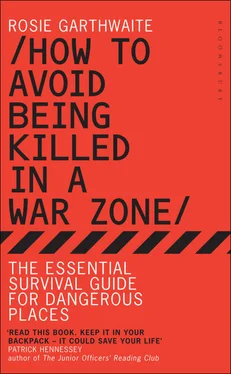I ended up wearing the abia only out of respect, never for disguise. If I was meeting a member of the Badr Brigade – the Shia armed group who clashed with the Mehdi army just after I left town – I would wear an abia so that he was able to talk to me. If I was meeting a recently bereaved family, I would cover my head to show I understood their values. They would often tell me to take it off. But they knew I was willing to try upholding their culture, even if my efforts didn’t work very well.
I think I was saved more than once by people wanting to protect me because I stood out. As one of the only blondes in Basra – the only one I ever saw – and a journalist who was listening to their stories, I was apparently dubbed ‘the angel’ by some people in the town. They would bang on the ice-cream parlour window, where I chose to interview all the most dangerous people I met, to let me know if trouble was coming. They would stand in front of my car window if we got stuck in a crowd so that no one would see who was inside. They would run into the Internet café I used every day and tell my translator when we needed to move on.
Then there was the army – the only people who knew where I lived in town. When I was with them I had to blend in too. I needed to be respectful, smart and familiar – I needed them to trust me. It was a difficult balance, especially given the complete lack of running water during my whole stay in Basra. A daily ‘baby wipe shower’ just didn’t cut it.
My advice would be that if you can blend in, then try to do so, especially for one-off encounters, such as checkpoints, or travelling on public transport. But if you are staying for a while, blend in only out of respect for the local culture, not to hide. In the long run you will be found out.
Others have different advice. James Brandon was in Iraq and Yemen for several years and found going undercover worked best for him. ‘The number one rule is to try to blend in with the locals. Wear a cheap shirt. Grow a beard. Go to a local barber’s and demand the latest style. If locals don’t wear seatbelts, then you shouldn’t either. The exception is footwear. Even if most locals wear sandals, you should stick to trainers (in a local fashion of course) because if people start shooting, you might need to run. Unless you can run in sandals, don’t wear them.
‘Remember that disguises that work in one part of the world won’t work in another. Heading up into northern Yemen to report on the civil war in late 2004 with an American journalist, I travelled in a battered pick-up truck with some sympathetic Yemenis. The other journalist and myself were dressed in the traditional Yemeni outfit of long grey thoab and Arab-style headdress, plus a belt and traditional curved tribal dagger. To complete the image, we chewed qat , the local drug beloved by Yemenis. As we neared our destination, we were flagged down in a stretch of barren, volcanic desert by two tribesmen carrying AK-47s. They asked for a lift and we were happy to oblige – two armed men in the back of our truck only added to our authenticity. As a result, we made it through over a dozen army checkpoints to get into this remote region declared strictly off-limits to foreigners. We were later arrested and thrown into prison, but that’s a different story.’
If you are in a location as part of a team, you must realize that the actions of one individual could harm the whole group, so you should lay down some rules. One (female) MSF volunteer explained to me how they went about it in Yemen during the battle between government forces and tribes in the north in 2007. Peace talks were under way, but it was very tense and one of the hardest places to work as an outsider. The tribal, social and religious divisions are incredibly complex in Yemen. Everyone carries weapons.
‘We established a strict dress code… to find a way to be respected by the tribal leaders and respect their culture at the same time. It is a completely patriarchal society. Women are not considered to have any value. If we looked just like the Yemeni women, we would be dismissed immediately, so we went halfway – we covered our heads. We wore long shirts down to our knees and over our trousers. We also avoided flashy colours. Once we had established what we thought was sensible, we wrote a behaviour code and no one was allowed into the country to work with MSF unless they agreed first to stick to it. It risked putting us in danger if they stood out or gave the group a bad name. No NGOs had worked in the area before us, so we decided to go low profile in the beginning. Our logo would not have offered us any protection.
‘When we were at home we had an understanding that we could do what we wanted inside our own four walls. We didn’t cover our heads. We wore T-shirts. And if people didn’t like it, they could leave. People respected that. We had a complete ban on alcohol. There was zero tolerance on that. And if you had a tattoo, you had to keep that covered. It is an extreme culture.’
Clothes are a uniform, and every choice you make is a sartorial sign of your tribe, whether it be a teenage traveller, an off-duty security guard or a group that is friendly to the Taliban. In Pakistan a millinery mistake could get you into trouble.
Kamal Hyder advises: ‘Be aware of the signals given by your clothes. In tribal areas I often carry several different types of turbans and hats, known locally as pakols . When you cross front lines you have to know which one to wear. In some areas the other side will just shoot at you if you are wearing the wrong one.
‘Foreigners should try to blend in too. They shouldn’t feel silly. There are many European-looking people in Afghanistan and Pakistan. Once upon a time, it didn’t matter what you wore. Many of these places used to be very hospitable to foreigners wandering around in T-shirts and trousers (never shorts). But because of the “War on Terror” the attitude has changed and you have to understand that. Xenophobia has crept into what used to be the easy-going hippy trail.
‘When I first started working in the tribal areas of Pakistan I was clean-shaven. I stuck out like a sore thumb. I was an outsider. Many people asked me why I didn’t have a beard given that I was speaking their language. So I grew one and started to blend into the local population.’
Kamal is now famous for his beard. It used to have its own fan club on Facebook.
Zeina Khodr has been working in dangerous places as a journalist for nearly 20 years. She says you should be careful of trying to ‘be’ one of the locals. A nod of respect towards their culture should be the aim:
‘Your “look” is important… there is no way to look exactly like the locals. It should be a balance. You don’t want to appear as if you are trying to be one of them; you might be taken for a spy. Don’t overdo it. I usually buy something from the local market. I want to look like I am a foreigner showing respect for the local customs. So while I might use a burka to travel in disguise, I can’t work in one because that would be showing a lack of respect to their local culture.’
I have worked with Sebastian Walker my whole career in one way or another. From the Baghdad Bulletin to Reuters in Iraq through to Al Jazeera, where he is now a star reporter, flying from his base in Washington DC out to one story or another. An open and unthreatening approach has won him many friends out of potential enemies. In Iraq his wide eyes and brown hair helped him get by as a young whippersnapper swimming around in a bowlful of sharks. He describes our first encounter as follows:
‘By late 2003, with the insurgency raging, there were only two field-based Western stringers working for the wire agencies in post-invasion Iraq. One was the author of this book, in Basra, and the other was me, in Mosul. Neither of us spoke Arabic, and the day job consisted of taxi rides around two cities quickly spiralling out of control, stopping frequently to interview witnesses at the scene of car bomb explosions, riots, attacks on coalition soldiers, and so forth. I have no idea how the blue-eyed, blonde-haired, young British girl got back in one piece.
Читать дальше




![Джонатан Димблби - Barbarossa - How Hitler Lost the War [calibre]](/books/385421/dzhonatan-dimblbi-barbarossa-how-hitler-lost-the-w-thumb.webp)







